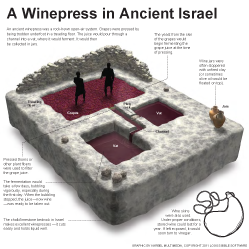24:1 times Job laments that the wicked are not judged in the following verses. This parallel suggests that Job’s question echoes the author of Ecclesiastes’ complaint about evil not being punished in a timely manner (Eccl 8:11). For this reason, some translations add “of judgment” to “times” here, resulting in the rendering “times of judgment.”
24:2 They remove border stones Moving boundaries—a way of illegally seizing land—was prohibited by the Law (Deut 19:14; 27:17; compare Prov 23:10–11).
24:3 the donkey of orphans Orphans and widows were among the poorest and most vulnerable in the ancient Near East. See note on Job 22:9.
they take the widow’s ox as a pledge See note on 22:6.
24:4 the needy of the earth hide themselves together Job asserts that the oppression of the poor is evidence that God’s judgment is delayed, if not absent (v. 1).
24:5 wild donkeys in the desert The poor must work extremely hard to provide for themselves.
24:6 they glean in the vineyard of the wicked Not only do the poor have a difficult life full of labor, their labor benefits the wicked.
24:9 They snatch the orphan from the breast In v. 3, the wicked seize the livestock of the poor. Here, they go further—seizing their children.
they take a pledge against the needy See 22:6 and note.
24:10 hungry, they carry the sheaves The poor are forced to work to provide food for others (presumably the wicked; see v. 6) while they themselves go hungry.
24:11 they tread the presses The three products Job describes—bread (from sheaves), oil, and wine
(from sheaves), oil, and wine —were viewed as blessings from God (see Deut 7:13; Jer 31:12). Those who had them in abundance are described as happy and satisfied (Psa 104:14–15; Joel 2:19).
—were viewed as blessings from God (see Deut 7:13; Jer 31:12). Those who had them in abundance are described as happy and satisfied (Psa 104:14–15; Joel 2:19).
24:12 the throat of the wounded cries for help Like Job, the oppressed on the earth cry out to God for help. Job demonstrates that he is not alone in claiming unjust treatment.
God does not regard it as unseemly Though oppression is rampant, God does not rectify unjust situations. The wicked get away with theft and oppression, and the poor go hungry and spend their days in hard labor to provide for the wicked.
24:13 the ones rebelling against the light Job describes the actions of the wicked in terms of light. Here, they figuratively rebel against the light (compare Psa 97:11; Prov 2:13). In Job 24:14–17, darkness is a tool the wicked use to hide their wickedness from both people and God (compare 22:13–14).
24:17 the terrors of deep darkness Bildad had argued that these same terrors (ballahah) surround the wicked.
24:18–25 In this section, Job seems to contradict his previous statements by agreeing with his friends that the wicked do experience punishment. Because it seems contradictory, some translations turn this section into a quote of Job’s friends by adding “You say” at the beginning. However, Job never explicitly says that God never judges the wicked. He merely points out that God’s judgment is not always present or timely (21:17; 24:1). Job also argues that the wicked eventually die, and later states that they will be cut off without hope (21:23–26; 27:7–9). Like the author of Ecclesiastes, Job wrestles with belief in God’s justice in face of the seemingly unjust suffering he has endured (see note on Eccl 8:13). This is not the first time Job expresses contradictory opinions (Job 14:10–17). Despite lamenting his inability to find vindication (9:15–20), Job also expresses faith that he will be vindicated (19:25–27). |
24:19 like Sheol The Hebrew text here refers to she’ol, the underworld—the realm of the dead. See note on 14:13.

|
About Faithlife Study BibleFaithlife Study Bible (FSB) is your guide to the ancient world of the Old and New Testaments, with study notes and articles that draw from a wide range of academic research. FSB helps you learn how to think about interpretation methods and issues so that you can gain a deeper understanding of the text. |
| Copyright |
Copyright 2012 Logos Bible Software. |
| Support Info | fsb |
 Loading…
Loading…

